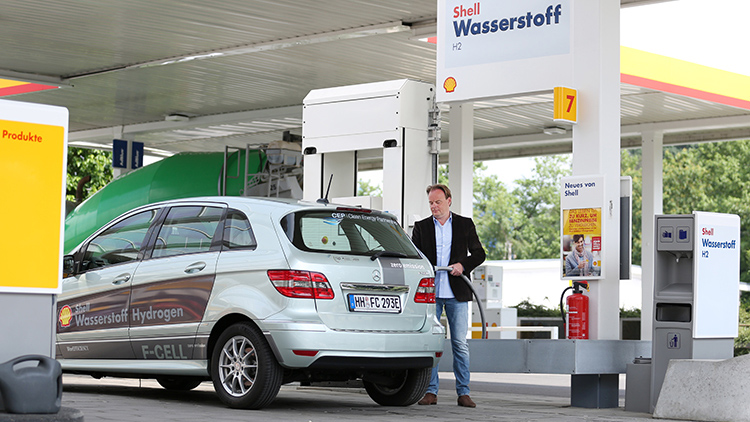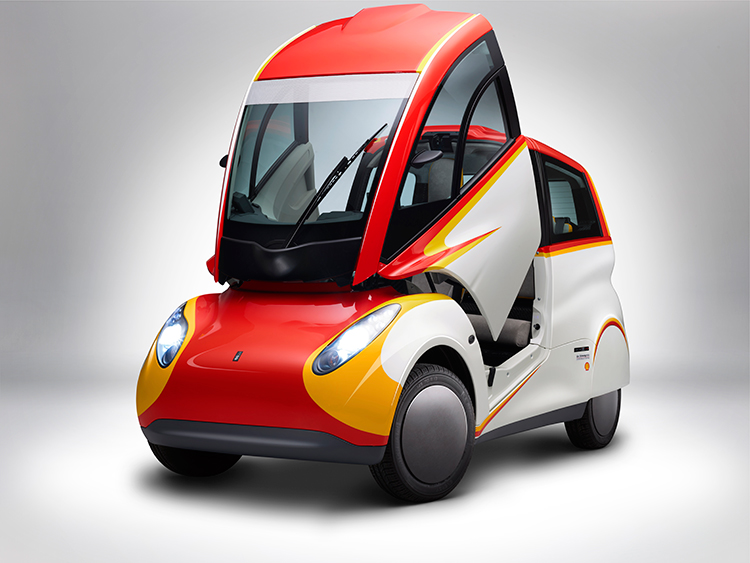Energy-efficient transport
Shell invests in a range of lower-carbon technologies and fuels, sometimes working with partners.
Energy efficiency is an important consideration in the development of our fuels and lubricants. Shell is taking part in several initiatives to encourage the adoption of hydrogen electric transport, and is developing a service that supports the charging of electric vehicles.
Efficient fuels
Shell supplies fuels to millions of drivers around the world every day. For more than a century, our scientists have worked to develop products to improve the driving experience and energy efficiency of our customers. For example, Shell FuelSave Diesel contains ingredients designed to improve fuel-efficiency for our customers.
Shell GTL Fuel uses a gas-to-liquids (GTL) technology that converts cleaner-burning natural gas into alternative diesel fuels. Shell GTL Fuels are virtually sulphur-free, odourless and help to improve local air quality. They can be used as a diesel fuel without requiring changes to the engine or investment in new heavy-duty road transport infrastructure, and as a fuel for shipping.
In 2016, the European Committee for Standardisation approved a new European standard for paraffinic diesel fuel, helping develop the market for these fuels. Paraffinic fuels are synthetic liquid fuels such as Shell’s GTL Fuel that are made from natural gas, biomass or vegetable oil. This new generation of cleaner transport fuels are colourless and odourless and contain almost none of the impurities – sulphur, aromatics and nitrogen – that are found in crude oil. Shell GTL Fuel is commercially available to customers in the Netherlands, Germany, the UK, Denmark and France.
Advanced lubricants
Lubricants are designed to increase the efficiency of equipment – including engines - and reduce fuel consumption. Shell is one of the largest investors among international energy companies in the research and development of lubricants for motorists, commercial vehicles and industrial sectors. We employ more than 200 scientists and engineers in lubricant research and development.
In 2016, Shell introduced a new range of heavy-duty engine oils in the USA, under the Shell Rotella brand. These were developed to meet the requirements of new American Petroleum Institute specifications for lubricants, which include reducing engine emissions.
We also produce motor oils that can improve the fuel efficiency of passenger cars and motorcycles. These include products manufactured using Shell PurePlus Technology, which applies the GTL process to produce a clear base oil. This has much lower levels of impurities than other base oils, and lubricants produced with this technology can help improve engine performance.
Energy challenge
Our annual Shell Eco-marathon competition challenges students worldwide to design and build energy-efficient vehicles. Held in the Americas, Africa, Asia and Europe, the events inspire young engineers to develop vehicles that can travel the furthest on the least amount of energy. The 2016 competition showcased a vehicle capable of travelling more than 2,600 kilometres on the equivalent of one litre of fuel.
Shell Concept Car
In 2016, Shell unveiled an energy-efficient city car called the Shell Concept Car. This is a collaboration between three companies: Shell, engine specialists Geo Technology and automotive engineers Gordon Murray Design.
In tests, the Shell Concept Car demonstrated a 34% reduction in primary energy use over its entire life cycle compared to a typical city car available in the UK.
In test results, the car runs at 38 kilometres (km) per litre at 70km/h. In formal testing (using the European Union’s New European Driving Cycle laboratory test), the Shell Concept Car produced lower CO2 emissions than a petrol-powered city car (28%).
Hydrogen

In Germany, the government is supporting the development of a national network of hydrogen electric fuelling stations.
Hydrogen has the potential to be an important low-carbon transport fuel and Shell is part of several initiatives to encourage the adoption of hydrogen electric energy.
Hydrogen fuel-cell electric cars do not emit greenhouse gases from their tailpipe – the only emission is water vapour. If the hydrogen comes from renewable sources of energy, and if it is produced at retail sites, then the fuel-cell vehicles have almost no emissions.
Hydrogen electric vehicles are quick to refuel and can drive a similar range to conventional cars. Energy is stored in compressed hydrogen fuel, rather than a battery, which means that hydrogen-powered cars can potentially drive up to 700 kilometres without refuelling. The cars take only three minutes to refuel – similar to current refuelling times for petrol and diesel cars.
Hydrogen electric transport can succeed if vehicle manufacturers and fuel suppliers, with the support of governments, work together. There needs to be sufficient refuelling infrastructure to attract customers, as well as incentives for businesses to build this infrastructure.
In Germany, for example, the government is supporting the development of a national network of hydrogen electric fuel stations across the country by 2023. We are working on this project with our joint-venture partners in H2 Mobility Germany – French gas supplier Air Liquide, German car manufacturer Daimler, Austrian oil and gas company OMV, German engineering firm Linde and French oil and gas company Total. The hydrogen will be delivered by truck as a gas to retail sites. Under the terms of the partnership, at least 50% of the hydrogen sold must be produced without emitting greenhouse gases. In 2016, the first two stations in the H2 Mobility network opened in Germany.
Outside this network, we also have three hydrogen filling stations in Germany and two in Los Angeles, California. In the UK, we are partnering with ITM Power, a company specialising in hydrogen fuel-cell products, to make hydrogen fuel available at three Shell retail sites in the southeast of the country. The first of the UK stations opened in February 2017. Shell is assessing the potential for similar projects in the USA, Canada, Switzerland, Austria, France, Belgium, Luxembourg and the Netherlands. For example, in California, USA, we are working with Toyota and the state government to build hydrogen refuelling stations, which Shell will own and operate when completed.
In January 2017, Shell and 12 other companies launched the Hydrogen Council, an initiative to raise the profile of hydrogen and its role in the energy transition. A report (PDF, 5.3MB) entitled How hydrogen empowers the energy transition further details hydrogen’s potential.

“Refuelling with hydrogen is safe, fast and customer-friendly”
External opinion
“Hydrogen plays a crucial role in sustainable mobility, providing a convenient fuel for transport, as well as flexibility and storage for the power and heat sectors.
Public-private activities such as the Clean Energy Partnership (CEP) in Germany have successfully demonstrated that refuelling with hydrogen is safe, fast and customer-friendly. This, along with the long range and the silent and powerful performance of fuel-cell cars and buses from various manufacturers, will encourage widespread acceptance by customers. That’s why companies have started selling fuel-cell electric vehicles and hydrogen fuel in key global markets.
Shell continues to help provide the transport sector with this sustainable fuel as a partner in the CEP and as a driving force behind the creation of H2 Mobility Germany – a joint venture that includes car manufacturers and oil and gas companies – and which is developing a network of hydrogen refuelling stations.”
Klaus Bonhoff
Managing Director, National Organization Hydrogen and Fuel Cell Technologies, Berlin, Germany
Electric mobility
Shell is looking into how we can serve the increasing number of people driving electric vehicles and the potential to introduce electric vehicle charging points at our retail sites in several countries.
We have also been developing technology that can support the integration of electric vehicles with the power grid. This technology explores how to charge electric vehicles at times when the cost of using power is low, and therefore cheaper for customers.
Since 2013, Shell has worked with partners in the power sector and commercial customers who have electric vehicles in their fleet to test this technology. We are now looking at introducing it in places such as California, USA, to help local governments push forward their goals for vehicles with zero emissions.

